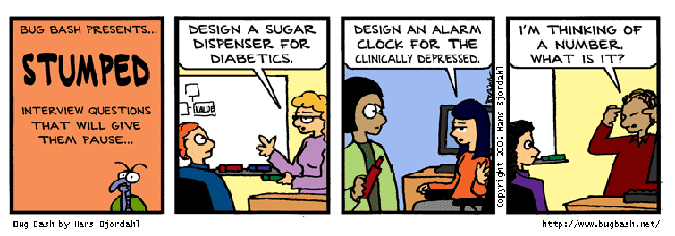![]()
contributed by James LeDoux [IT training consultant / travel enthusiast / dancing machine]
When it comes to interviews, politicians know that intense preparation wins the game. They enlist teams to assist them in answering questions, coaching them for almost any curve ball pitched their way.  Though you never want to sound rehearsed, if you’ve prepared correctly, you should rarely ever be surprised by a question any given interviewer throws at you. While no single article can prepare you completely, this one will get you started. I have compiled a list of the Seven Deadly (a.k.a. Common) Interview queStIoNS. Read them, ponder them seriously, and jot down your answers on flash cards for review. It might sound silly, but take a cue from the politicos and recruit a friend or two to help you with some mock interview sessions. You may feel ridiculous at first, but all the practice will really take the edge off when the real thing begins.
Though you never want to sound rehearsed, if you’ve prepared correctly, you should rarely ever be surprised by a question any given interviewer throws at you. While no single article can prepare you completely, this one will get you started. I have compiled a list of the Seven Deadly (a.k.a. Common) Interview queStIoNS. Read them, ponder them seriously, and jot down your answers on flash cards for review. It might sound silly, but take a cue from the politicos and recruit a friend or two to help you with some mock interview sessions. You may feel ridiculous at first, but all the practice will really take the edge off when the real thing begins.
1. Why should we hire you”
The first time I heard this question I nearly fainted. Depending on the timing of the question, it can be a genuine chance for you to highlight your skills and desire for the job. If it comes at you near the beginning of the interview, it may be an attempt to see if you rattle easily. Regardless of the timing, answering it calls for a dash of confidence and gusto. The best approach is to have gleaned what qualities are important to them, either from remarks made earlier in the interview or from the presented job description.
2. What is your biggest weakness”
Like it or not, we all have weaknesses. Pretending you don’t have any won’t get you extra points. While some try to use a negative trait as a positive – such as “I’m a workaholic” or “I’m a perfectionist” – I would suggest a different approach. Honestly assess your skill set and identify one area of improvement. Next, develop an action plan to address it. For example: If public speaking is difficult for you, enroll in Toastmasters. During the interview you could then honestly say that speaking in front of large groups makes you nervous but you are doing something about it. You’ll win huge points for that.
3. How much will it take to bring you on board”
Employers typically look at three top factors for hiring: cost, capability, and culture. If you are too expensive, they often will try to weed you out during the first interview to save time. My article, Confessions of a Telemarketer, covers this topic in more detail, but this is the start of a negotiation. I would recommend attempting to forestall this discussion until both you and they know it is an ideal fit. Saying something like: “I would prefer to discuss salary requirements with the context of an offer” may buy you some time. If pinned down, you can try a large range (based on your previous homework!), which should give plenty of room for both parties later on during the actual negotiation.
4. What would your old boss co-workers say about you”
Regardless of the circumstances of leaving your last job, your answer should be easy and be made with no hesitation. “They would say I was a talented and hard worker.” Or anything else positive you care to share. Legally they could be liable for saying anything other than that . In any event, you should choose references that think highly of you!
5. Can you give me a specific example where you solved a difficult problem”
This is a straightforward question that deserves a straightforward answer. Think back on work or school situations to a problem that you found a solution to. Interviewers are looking for problem solvers, but they also want someone who can communicate clearly. This question can give insight into your problem-solving ability and communication style. Develop three examples and be comfortable talking about each at length. Variations of this question may involve problems with clients or co-workers.
6. Give us examples of how you have gone above and beyond.
While a Steady Eddie may get the job done, employers are not merely looking for good employees. They hope and dream of finding great employees. Pick an example from your history where you made a real effort to get results that wasn’t necessarily because someone told you to. Some folks really just do the minimum to get by with little thought as to their long-term career growth. Extra effort in your tasks will pay big dividends over time. Maybe this means doing an illustration by hand instead of using your PC. Perhaps it means doing extra research on a new technology that leads to large cost saving process changes. Think about it.
7. Why are leaving your current job”
People leave jobs for many reasons. Regardless of the reason, avoid giving negative ones. If you left your last job because your boss was a jerk, you gain nothing by saying that here. In fact, mentioning it will cause the jerk to get you twice since you left one job because of him and now most likely will not get another because you spoke ill of him to the interviewer. Employers want positive workers who get along with clients and colleagues. Don’t give them any reason to think that you are not. If you did indeed have a bad boss, say something like: “I want to pursue a company with more room for long-term career growth” or “I want more interesting and challenging assignments that will help me grow.” Be positive, and it will usually work out. This question kept me from getting an offer one time as I answered that I wanted a “better work / life balance.” It turns out the firm had a reputation of working their employees like dogs. My answer – while positive for me – turned out to be negative for them. But at least it saved us both some grief.

General Tips
- Listen carefully and wait until the whole question has been asked. If you answer too soon, you might reveal something you shouldn’t.
- Don’t ramble during your answers – get to the point. Long, drawn out answers may bore the interviewer or, again, cause you to let something slip.
- Use humor with caution. Though P&C loves to laugh, sadly, not everyone does.
- Review the company history, key markets, and the company’s main competitors. Having just a little bit of extra information will show your interviewer you’re serious.
- Bring a notepad in a professional looking portfolio. Just like your shoes, your interviewer will be looking. Borrow one if you have to.
- Match your attire to the situation. See DON’T EMBARRASS YOURSELF – June 2005.
- Check the web for postings on questions the company has asked in the past. Some companies have earned a reputation for tough or odd questions. There is a good chance someone may have blogged or posted to a forum.
- And last but not least, strive for the 3 Cs: Calm, Cool, and Collected. Some upfront practice will make all the difference!
Now go out there and get hired!!!
EDITOR’S NOTE: This article was quite timely. James wrote it while actively interviewing, and he found himself guessing the questions before they were lobbed at him. As it turned out, it worked well. He had two interviews, which led to two offers. He started his new gig last week and scored a 25% raise too. This man knows of what he writes.


